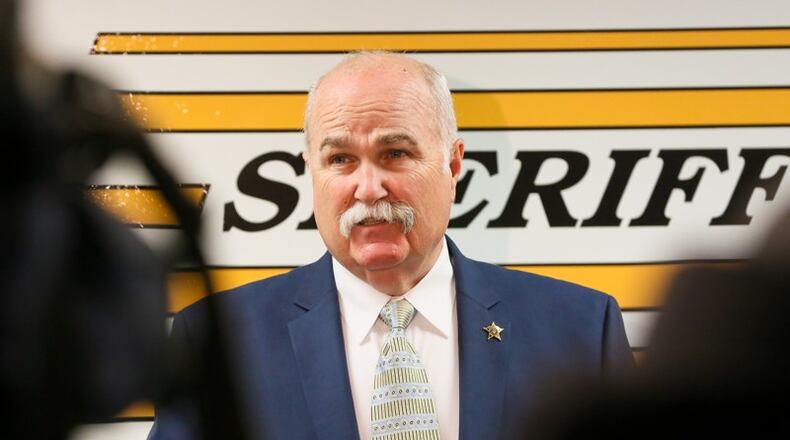The sheriff’s office has been assisting the county health department with quarantine issues. The sheriff’s office has the largest dispatch center in the county and currently dispatches for 15 fire and 12 EMS departments and eight police agencies, including Hamilton and Oxford.
MORE ON CORONAVIRUS
• Butler County health leader details coronavirus case data, needs in coming weeks
• Living through coronavirus: Delivering pizzas in costume to keep a Middletown skating rink running
• 'My gut told me we needed to prepare for it': Butler County businesses change for stay-at-home order
The sheriff said the department has been able to enter quarantine addresses into the department’s dispatch system so when fire, EMS or police are dispatched to that location they are immediately notified that it is a known quarantine location. This data does not contain any names, just the location of those quarantined.
“I find this disturbing and unacceptable,” Jones said. “I may be sending police and life squad members to a quarantined location without their knowledge. I understand the need to treat everyone as if they have the virus, but realistically we do not have the personal protective equipment to wear on every call.
“To have this information and not share with first responders is reckless. After all, law enforcement may be called to these locations to enforce the quarantine order, are they going to share it then?”
Jackie Phillips, Middletown health commissioner, said the department is not providing the information. The sheriff’s office does not dispatch for Middletown.
Phillips pointed to a directive from the Bureau of Infectious Diseases for the Ohio Department of Health stating the policy. Hamilton officials said they are following the same directive but are looking “forward to more clarity from the State of Ohio, however in the meantime, the City will pursue any avenue available to it to provide this information to our public safety personnel as soon as possible.”
“The health and safety of our first responders is critical in the fight against this pandemic,” the city said in a statement. “While they're important to our effort, they're also our coworkers, friends, and family. To be clear, the City believes the locations of those who are infected or quarantined as a result of COVID-19 is valuable information that should be shared with public safety and dispatch personnel.
“When Hamilton received its first confirmed case of COVID-19 two days ago, the Health Department was operating under guidance from the Bureau of Infectious Diseases at the Ohio Department of Health not to provide the locations of residents who have tested positive for COVID-19.”
Both Hamilton and Middletown officials said they are following the guidance from the state.
“Due to privacy concerns, we would not provide addresses for any confirmed case of COVID-19 in any county. You are correct that law enforcement and EMS should respond to respiratory events using appropriate precautions,” the bureau said in an email to Phillips. “Additionally, knowing the addresses of confirmed cases will not protect them from cases that we do not yet know about, or from visitors to their area who are cases.”
Jones said he was given the same explanation that “it will be better for us in the long run because we will treat everyone as though they have got it, which is (expletive).”
“If you were a policeman or a life squad medic, would you want to know if you were dispatched to house with someone infected?” Jones said. “If they (health department) knows who’s got it, we should know.”
While the sheriff’s office does not dispatch Middletown police and fire runs and doesn’t routinely respond to calls inside the city, Jones said his officers assist throughout the county and are process servers in the city.
Phillips said the department does not release names and addresses for people with communicable diseases, including HIV, tuberculosis, or syphilis.
Months ago, when investigators thought the virus may have come from travelers to China, a few addresses, but no names, were provided, she said.
“But once it become community spread, it is kind of like a false protection for us to say, ‘Don’t go to street A and B,’ when D may have the same threat and we don’t know yet,” Phillips said.
But she added if she responded to a home with a person under quarantine, she would tell officers or medics with her to don protective gear.
Butler County Health Commissioner Jennifer Bailer said after consulting with her legal counsel, which is the prosecutor’s office, she will continue to provide the information to the sheriff’s office. She cited home rule law.
“In the state of Ohio, each local health district has what is called home rule that means they make certain decisions on their own … this is one of those areas,” Bailer said.
After checking with the county prosecutor, who ruled release of the information did not violate any other code or rules, she said she will continue to provide the information.
“I chose to do this in order to protect the health and safety of our first responders and do everything we can to prevent them from getting COVID disease,” Bailer said. “It is a difficult area, and it was a hard decision to make, but in consultation with our prosecutor, that is the decision that this local health district made.”
Bailer said other local health districts can make their own decision because they all have home rule.
“Most of the time the three local health commissioners try to confer and come to a consensus on things, because it is easier the the public to understand,” she said. “But in this case there were different opinions of prosecutors, the law is up to interpretation. That is the decision we made and we really want to do everything we can to protect our first responders.”

